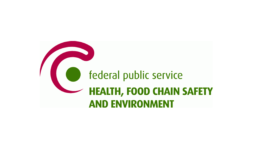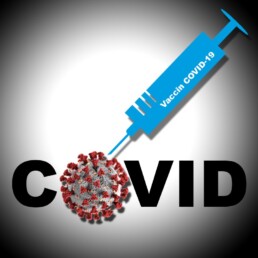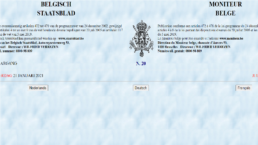Jaarstatistieken met betrekking tot de beofenaars van gezondheidszorgberoepen in België
Federale Overheidsdienst, Volkgezondheid, Veiligheid van voedselketen en leefmilieu heeft de ” jaarstatistieken met betrekking tot de beoefenaars van gezondheidszorgberoepen 2020″ in België gepubliceerd.
Jaarstatistieken met betrekking tot de beoefenaars van gezondheidszorgberoepen in België: aantal beoefenaars op 31/12/2020 en instroom 2020.
Voor elke beroepstitel die betrokken is bij de gezondheidszorg, worden de jaarstatistieken opgesplitst volgens de gewesten en provincie van domicilie, per leeftijdscategorie en volgens het geslacht van de personen die op 31/12/2020 geregistreerd staan in de federale databank van de gezondheidszorgbeoefenaars. De gegevens omvatten de « voorraad » aan gezondheidszorgbeoefenaars die het beroep mogen uitoefenen, alsook de instroom voor het afgelopen jaar.
Als u meer gedetailleerde statistieken wenst van de beoefenaars van gezondheidszorgberoepen kan u het Excel-document van de jaarstatistieken raadplegen.
112th General Assembly of the European Federation of Nurses Associations (EFN)
15 april 2021
De Algemene Unie der Verpleegkundigen van België is a member of EFN.
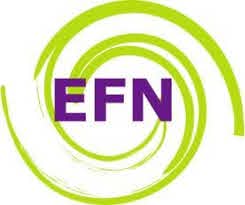 The EFN Members’ National Nurses Associations met online, on 15 April 2021, for the Spring EFN General Assembly, focusing on key points to take EFN EU lobby work further, and to get political results within the EU Institutions, especially in this difficult time of the COVID-19 crisis.
The EFN Members’ National Nurses Associations met online, on 15 April 2021, for the Spring EFN General Assembly, focusing on key points to take EFN EU lobby work further, and to get political results within the EU Institutions, especially in this difficult time of the COVID-19 crisis.
Ana Rita Cavaco, Ordem dos Enfermeiros President, welcomed the EFN Members to the General Assembly, stressing that “We are living turbulent times, the health situation across Europe is still extremely uncertain and delicate. The impact of the pandemic on the economy and society are unprecedented. Nurses are the backbone of all communities and with growing healthcare demands, we cannot allow the number of experienced nurses to continue to leave the profession. There is an urgent need to support and retain our current workforce. We need to make our voice heard and we need urgent actions from governments, including making improvements to pay and working conditions, and provide the appropriate mental health support to help them deal with the traumas of the past year.”
This was a good opportunity to share key information on the European Commission 2021 priorities and to emphasise the importance of following up the Action Plan of the European Pillar of Social Rights, to seize the opportunities for a healthy recovery post COVID-19, including the Multiannual Financial Framework 2021-2027 and the NextGenerationEU, also known as “Recovery Fund or Recovery Plan”, crucial instruments to build the resilience of the nursing workforce in the EU. Within this context of recovery, it is important to implement the EFN Workforce Matrix 3+1, which builds on the EU Directive 2013/55/EU and the EFN Competency Framework for General Care Nurses. The importance of qualified and competent nursing personnel is intrinsically linked to appropriate, safe and high-quality care for all patient and citizens in all health settings.
The EFN Members discussed and approved 3 key Policy Statements: on “Nurses’ Mentorship”, linked to the EFN EU Project QualMent; on the “Gender-Based Violence Against Nurses”; and one on “Nurses Co-Designing Artificial Intelligence Tools”. The involvement of EFN in 4 EU-funded projects as end-user partner is key to translate EFN Position Statements into frontline practice. The EFN is currently involved in QualMent, coming to end in September 2021; in 2 EHR H2020 projects InteropEHRate and Smart4Health; and IMMUNION, just launched, focusing on vaccination hesitance, linking to the work of the Coalition for Vaccination for Healthcare Professionals, of which EFN is a co-chair, together with CPME and PGEU.
The EFN Members also provided information on the possible gender or profession-based violence and/or discrimination that nurses may be experiencing at the national level. This valuable information is extremely important for the EFN to lobby the EU institutions, and in particular the European Commission, DG Justice, when they publish new funding and tender opportunities on EU Projects for tackling these issues, and make sure nurses are better prepared, protected and supported.
Finally, the EFN Members reaffirmed their dedicated commitment to ensuring that nurses’ united voice is heard at EU level and considered in the design of fit-for-purpose policies that affect the nursing profession. The Pact for Skills, especially digital skills, is an important EU action to build resilience. The COVID-19 pandemic still has an enormous impact across all layers of society. During such times of health crisis, it is vitally important to support frontline nurses, to respond to the challenges without compromising their safety and wellbeing, and to continue to encourage investment in the nursing workforce to combat the enormous shortages.
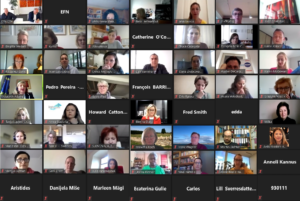
Veel gestelde vragen over AstraZeneca-vaccin
Als verpleegkundigen ben je bevoegd om te vaccineren. U krijgt vragen over het AstraZeneca-vaccin.
De FAQ kunnen u helpen ze te beantwoorden. De antwoorden werden geschreven/bekeken door Prof. Pierre Van Damme.
Voorbeelden van vragen:
- Waarom kan het AstraZeneca-vaccin nu wel toegediend worden bij personen ouder dan 55 jaar, en een maand geleden niet?
- Kan een persoon die al 1 keer werd ingeënt met het AstraZeneca-vaccin een tweede dosis krijgen met een ander vaccin?
Ik heb de eerste dosis al gehad en ik twijfel over de tweede dosis. Is er een alternatief? - …
Voor meer informatie:
FAQ AZ QA in het Nederlands april 2021
FAQ AZ QA in het Frans april 2021
FAQ AZ QA in het Deutch april 2021
FAQ AZ QA in het Engels april 2021
Om verder te gaan, het gepubliceerde advies van het European Medicines Agency (EMA) over AsraZeneca op 7 april 2021 : “AstraZeneca’s COVID-19 vaccine: EMA finds possible link to very rare cases of unusual blood clots with low blood platelets“
Verlenging - Wet van 6 novembre 2020
In het Staatsblad van 30 maart 2021 werden twee KB’s gepubliceerd die het mogelijk maken om “de wet van 6 november 2020 om toe te staan dat in het kader van de coronavirus-COVID-19-epidemie verpleegkundige activiteiten worden uitgeoefend door personen die wettelijk daartoe niet bevoegd zijn” te verlengen tot 1 oktober 2021.
Bijkomend wordt ook mogelijk gemaakt om extra de uitvoering van wondzorg te delegeren aan door personen die wettelijk daartoe niet bevoegd zijn
Vanuit de AUVB-UGIB-AKVB betreuren we deze verlenging van deze wet. Integendeel vroegen we de afschaffing van deze uitzonderings-wetgeving. Immers is er voldoende potentieel en inzet om de kwaliteit van de zorg aan de bevolking te garanderen. Er is geen enkele nood om afbreuk te doen aan de wettelijke bevoegdheid en professionele erkenning van de verpleegkunde. Op geen enkel moment is het tot nu noodzakelijk geweest om de uitzonderingswetgeving toe te passen en om niet-verpleegkundigen verpleegkundige handelingen te laten overnemen.
U vindt de betrokken KB’s in bijlage.
Voorbereiding, uitvoering van en toezicht op wondverzorging werd toegevoegd aan de lijst van niet te delegeren taken.















